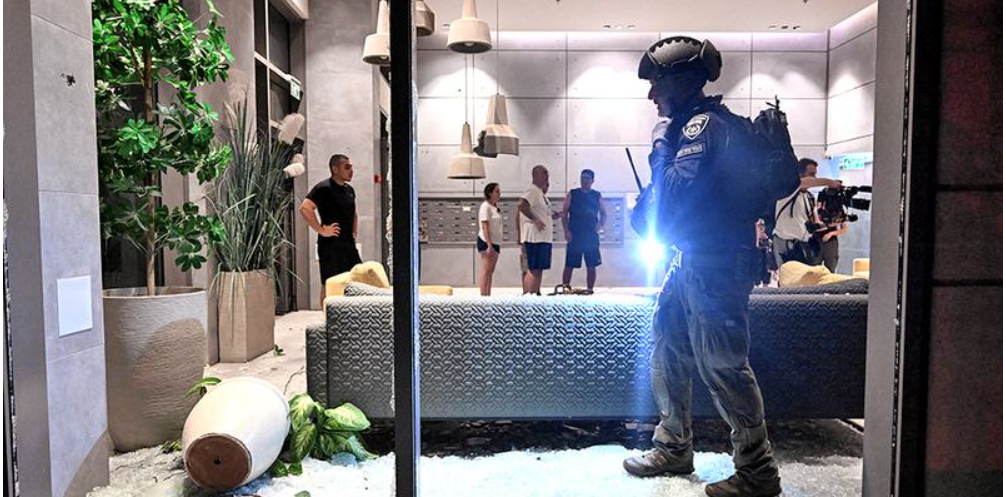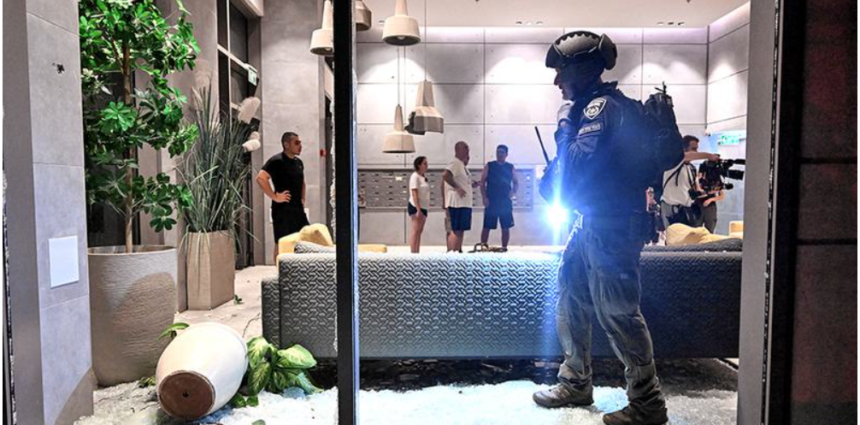Haifa Middle East has long been a battleground of geopolitical tensions, deeply rooted historical grievances, and military conflicts that ripple beyond borders. Recently, the situation has taken another alarming turn as Hezbollah, the Lebanon-based militant group, launched rockets targeting two prominent cities in northern Israel: Haifa and Tiberias. This attack left at least 10 individuals injured and further inflamed the already volatile relationship between Israel and Hezbollah, heightening concerns of a potential escalation into a broader conflict.
Background of Hezbollah-Israel Tensions
To understand the significance of this recent attack, it is essential to grasp the history and dynamics between Hezbollah and Israel. Hezbollah, a Shiite militant group, emerged in the early 1980s during the Lebanese Civil War and has long positioned itself as a resistance movement against Israeli presence in southern Lebanon. Since the withdrawal of Israeli forces from Lebanon in 2000, the group has expanded its military and political influence, becoming a formidable force in the region.
The 2006 Lebanon War, fought between Hezbollah and Israel, remains one of the most significant confrontations between the two parties. It ended in a United Nations-brokered ceasefire, but the animosity never truly dissipated. In the years since, Hezbollah has built a vast stockpile of rockets and missiles, some reportedly supplied by Iran and Syria, capable of reaching deep into Israeli territory. Israel, in response, has carried out numerous airstrikes in Syria and Lebanon targeting Hezbollah positions, with both sides regularly exchanging threats.
The Attack: Haifa and Tiberias in the Line of Fire
On a fateful day, residents in Haifa and Tiberias were shaken by the sound of sirens, warning of incoming rocket fire. Within moments, multiple rockets launched by Hezbollah struck the cities. Haifa, Israel’s third-largest city and a significant industrial hub, was hit near its port area, causing fires and explosions that sent thick plumes of smoke into the air. Tiberias, a popular tourist destination situated on the western shore of the Sea of Galilee, was also targeted. The strikes resulted in extensive damage to buildings and vehicles, and at least 10 people were reported injured, with some in serious condition.
The Israeli Iron Dome missile defense system, which has successfully intercepted many incoming rockets over the years, was activated. While it managed to prevent some of the rockets from causing catastrophic damage, a few made it through the defense shield, underscoring the challenges Israel faces in dealing with Hezbollah’s vast arsenal of projectiles.
Immediate Reactions and Responses
The Israeli government responded swiftly to the attacks, vowing that Hezbollah would face severe consequences for targeting civilian areas. Prime Minister Benjamin Netanyahu convened an emergency security meeting with top military and intelligence officials. In a statement, Netanyahu emphasized that Haifa Israel would not tolerate such provocations and would take all necessary measures to protect its citizens and maintain the country’s sovereignty.
“Israel is under attack, and we will respond with full force,” Netanyahu declared. “Our enemies must know that we will defend our people and ensure that those responsible for this aggression are held accountable.”
The Haifa Israel Defense Forces (IDF) immediately launched retaliatory strikes on suspected Hezbollah positions in southern Lebanon. Reports from Lebanese media indicated that Israeli jets targeted Hezbollah’s infrastructure, including command centers and weapons depots. The intensity of the retaliatory strikes raised concerns about the possibility of a full-scale war between the two sides, with regional actors watching closely.
Hezbollah’s Motivations and Message
The timing of Hezbollah’s rocket attack is significant and could be interpreted in several ways. First, Hezbollah’s leadership has made no secret of its desire to maintain a stance of “resistance” against Israel. By launching rockets into Israel, Hezbollah likely intended to send a message of defiance, demonstrating that it remains a force to be reckoned with in the region. The group has often sought to align its actions with broader regional dynamics, especially those related to Iran, its key backer.
Iran’s influence over Hezbollah cannot be overstated. Tehran views the militant group as a critical part of its “axis of resistance,” a coalition of forces opposed to U.S. and Israeli influence in the Middle East. Hezbollah’s attack could be seen as a response to recent Israeli actions targeting Iranian positions in Syria, a proxy battlefield between Iran and Israel. By striking at Israel, Hezbollah may have intended to show that any attack on its allies would be met with a swift and aggressive response.
Moreover, the attack came at a time of heightened tensions in the broader region, with Israel engaged in diplomatic efforts to normalize relations with several Arab states, including Saudi Arabia. Hezbollah, which sees itself as a protector of Palestinian and Arab interests, might view these developments as a threat to its ideological position. The group could be seeking to remind the Arab world that the struggle against Israel is far from over, even as peace deals are being brokered elsewhere.
The Humanitarian Impact: Lives Disrupted
For the residents of Haifa and Tiberias, the rocket attacks were a stark reminder of the ever-present threat of violence in the region. Schools and businesses were forced to close, and many people sought shelter in bombproof rooms or underground bunkers. Emergency services worked tirelessly to attend to the injured and contain the fires caused by the explosions.
Among the 10 injured, Haifa several were civilians who had been going about their daily lives when the rockets struck. One of the more severely injured victims was a woman who had been in her car near the Haifa port when a rocket exploded nearby. She suffered shrapnel wounds and was rushed to a nearby hospital for treatment. Others sustained injuries from falling debris or were hurt while trying to flee to safety.
The psychological toll of such attacks is profound. For many Israelis, the fear of rocket fire is a constant reality, particularly for those living in northern Israel, where the threat from Hezbollah looms large. The sound of sirens and the sight of rockets streaking through the sky trigger panic and anxiety, especially among children and the elderly. In the aftermath of the attack, mental health professionals were mobilized to provide support to those affected, offering counseling services to help residents cope with the trauma.
Regional and International Reactions
The international community swiftly condemned the Hezbollah rocket attack, with several countries and organizations calling for restraint and a de-escalation of violence. The United Nations, which maintains a peacekeeping force along the Israel-Lebanon border, urged both sides to refrain from further provocations and to adhere to the terms of the 2006 ceasefire agreement. 
The United States, a key ally of Israel, Haifa expressed solidarity with the Israeli government and condemned Hezbollah’s actions. In a statement, the U.S. State Department said, “We stand with Israel in its right to defend itself against terrorist attacks and call on Hezbollah to cease its aggression immediately.”
At the same time, Lebanon’s fragile political situation has made it difficult for the Lebanese government to take a strong stance against Hezbollah, which holds significant sway in the country’s political system. The Haifa Lebanese government distanced itself from the attack but called for restraint on both sides to prevent the conflict from spiraling out of control.
Potential for Escalation
The attack on Haifa and Tiberias has raised fears that the region could be on the brink of a major military conflict. The Israeli government’s vow to retaliate, coupled with Hezbollah’s readiness to continue its resistance, creates a volatile situation that could easily spiral into a full-scale war. Any such conflict would likely have devastating consequences not only for Israel and Lebanon but also for the wider Middle East.
Experts have warned that an escalation could draw in other actors, including Iran and Syria, both of which have vested interests in the region’s geopolitical landscape. Iran’s involvement could further complicate matters, as it is already engaged in proxy conflicts in Syria and Yemen. Additionally, the involvement of regional powers such as Saudi Arabia and the Gulf States could lead to a broader confrontation that transcends national borders.
Conclusion: A Region on Edge
The Hezbollah Haifa rocket attack on Haifa and Tiberias marks another chapter in the long and troubled history between the militant group and Israel. As both sides brace for potential escalation, the international community must work urgently to prevent further violence and encourage dialogue. The Middle East, already beset by conflicts and political instability, cannot afford another war that would bring more suffering to its people. The coming days and weeks will be crucial in determining whether this latest flare-up leads to a broader conflict or if cooler heads can prevail to de-escalate the situation. ALSO READ:-Mithun Chakraborty: A Legendary Journey to the Dadasaheb Phalke Award – A Quiz to Test Your Knowledge 2024





